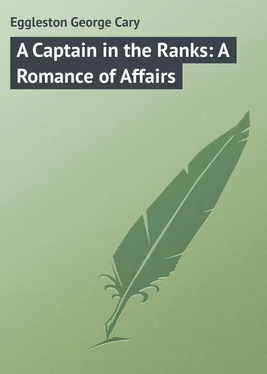George Eggleston - A Captain in the Ranks - A Romance of Affairs
Здесь есть возможность читать онлайн «George Eggleston - A Captain in the Ranks - A Romance of Affairs» — ознакомительный отрывок электронной книги совершенно бесплатно, а после прочтения отрывка купить полную версию. В некоторых случаях можно слушать аудио, скачать через торрент в формате fb2 и присутствует краткое содержание. Жанр: foreign_prose, на английском языке. Описание произведения, (предисловие) а так же отзывы посетителей доступны на портале библиотеки ЛибКат.
- Название:A Captain in the Ranks: A Romance of Affairs
- Автор:
- Жанр:
- Год:неизвестен
- ISBN:нет данных
- Рейтинг книги:4 / 5. Голосов: 1
-
Избранное:Добавить в избранное
- Отзывы:
-
Ваша оценка:
- 80
- 1
- 2
- 3
- 4
- 5
A Captain in the Ranks: A Romance of Affairs: краткое содержание, описание и аннотация
Предлагаем к чтению аннотацию, описание, краткое содержание или предисловие (зависит от того, что написал сам автор книги «A Captain in the Ranks: A Romance of Affairs»). Если вы не нашли необходимую информацию о книге — напишите в комментариях, мы постараемся отыскать её.
A Captain in the Ranks: A Romance of Affairs — читать онлайн ознакомительный отрывок
Ниже представлен текст книги, разбитый по страницам. Система сохранения места последней прочитанной страницы, позволяет с удобством читать онлайн бесплатно книгу «A Captain in the Ranks: A Romance of Affairs», без необходимости каждый раз заново искать на чём Вы остановились. Поставьте закладку, и сможете в любой момент перейти на страницу, на которой закончили чтение.
Интервал:
Закладка:
The marauders had established themselves in four or five of the negro quarters on the plantation, and in a certain sense they were strongly fortified. That is to say, they were housed in cabins built of logs too thick for any bullet to penetrate them. Four of these cabins were so placed that a fire from the door and the windows of either of them would completely command the entrance of each of the others. But to offset that, and to offset also the superiority of numbers which the marauders enjoyed, Guilford Duncan decided upon an attack by night. He knew that he was outnumbered by two or three to one, even if he counted the willing but untrained negroes whom he had enlisted in this service. But he did not despair of success. It was his purpose to dislodge the marauders in a night attack, when he knew that they could not see to shoot with effect. He knew also that "He is thrice armed who knows his quarrel just."
Cautioning his men to maintain silence, and to advance as quickly as possible, he got them into position and suddenly rushed upon the first of the four or five negro quarters. Knowing that the door of this house would be barricaded, he had instructed some of the negroes to bring a pole with them which might be used as a battering ram. With a rush but without any hurrah, – for Duncan had ordered quiet as a part of his plan of campaign, – the negroes carried the great pole forward and instantly crushed in the door. Within ten seconds afterwards Duncan's ex-Confederate soldiers, with their pistols in use, were within the house, and the company of marauders there surrendered – those of them who had not fallen before the pistol shots. This first flush of victory encouraged the negroes under his command so far that what had been their enthusiasm became a positive battle-madness. Without waiting for orders from him they rushed with their battering ram upon the other houses occupied by the marauders, as did also his men, who were not accustomed to follow, but rather to lead, and within a few minutes all of those negro huts were in his possession, and all their occupants were in effect his prisoners.
At this moment Guilford Duncan, who had now no legal or military authority over his men, lost control of them. Both the negroes and the white men seemed to go mad. They recognized in the marauders no rights of a military kind, no title to be regarded as fighting men, and no conceivable claim upon their conquerors' consideration. Both the negroes and the white men were merciless in their slaughter of the marauding highwaymen. Once, in the mêlée , Guilford Duncan endeavored to check their enthusiasm as a barbarity, but his men responded in quick, bullet-like words, indicating their idea that these men were not soldiers entitled to be taken prisoners, but were beasts of prey, rattlesnakes, mad dogs, enemies of the human race, whose extermination it was the duty of every honest man to seek and to accomplish as quickly as possible.
This thought was conveyed rather in ejaculations than in statements made, and Guilford Duncan saw that there was neither time nor occasion for argument. The men under his command felt that they were engaged in defending the lives and the honor of women and children, and they were in no degree disposed to hesitate at slaughter where so precious a purpose inspired them. Their attitude of mind was uncompromising. Their resolution was unalterable. Their impulse was to kill, and their victims were men of so despicable a kind that after a moment's thought Guilford Duncan's impulse was to let his men alone.
The contest lasted for a very brief while. The number of the slaughtered in proportion to the total number of men engaged was appalling. But this was not all. To it was immediately added the hasty hanging of men to the nearest trees, and Guilford Duncan was powerless to prevent that. The negroes, loyal to the mistresses whom they had served from infancy, had gone wild in their enthusiasm of defense. They ran amuck, and when the morning came there was not one man of all those marauders left alive to tell the story of the conflict.
In the meanwhile Guilford Duncan, by means of his men, had gathered information in every direction. He knew now that all hope was gone of his joining Johnston's army, even if that army had not surrendered, as by this time it probably had done. He therefore brought his men together. Most of them lived in those mountains round about, or in the lower country east of them, and so he said to them:
"Men, the war is over. Most of you, as I understand it, live somewhere near here, or within fifty miles of here. As the last order that I shall ever issue as a captain, I direct you now to return to your homes at once. My advice to you is to go to work and rebuild your fortunes as best you can. We've had our last fight. We've done our duty like men. We must now do the best that we can for ourselves under extremely adverse circumstances. Go home. Cultivate your fields. Take care of your families, and be as good citizens in peace as you have been good soldiers in war."
There was a hurried consultation among the men. Presently Sergeant Garrett spoke for the rest and said:
"We will not go home, Captain Duncan, until each one of us has written orders from you to do so. Some of us fellows have children in our homes, and the rest of us may have children hereafter. We want them to know, as the years go by, that we did not desert our cause, even in its dying hours, that we did not quit the army until we were ordered to quit. We ask of you, for each of us, a written order to go home, or to go wherever else you may order us to go."
The Captain fully understood the loyalty of feeling which underlay this request, and he promptly responded to it. Taking from his pocket a number of old letters and envelopes, he searched out whatever scraps there might be of blank paper. Upon these scraps he issued to each man of his little company a peremptory order to return to his home, with an added statement in the case of each that he had "served loyally, bravely, and well, even unto the end."
That night, before their final parting, the little company slept together in the midst of a cluster of pine trees, with only one sentry on duty.
The next day came the parting. The captain, with tears dimming his vision, shook hands with each of his men in turn, saying to each, with choking utterance: "Good-by! God bless you!"
Then the spokesman of the men, Sergeant Garrett, asked:
"Are you going home, Captain Duncan?"
For twenty seconds the young Captain stared at his men, making no answer. Then, mastering himself, and speaking as one dazed, he replied:
"Home? Home? On all God's earth I have no home!"
Instantly he put spurs to his horse, half unconsciously turning toward the sunset.
A moment later he vanished from view, over the crest of a hill.
II
Alone in the High Mountains
The young man rode long and late that night. His way lay always upward toward the crests of the high mountains of the Blue Ridge Range.
The roads he traversed were scarcely more than trails – too steep in their ascent to have been traveled by wagons that might wear them into thoroughfares. During the many hours of his riding he saw no sign of human habitation anywhere, and no prospect of finding food for himself or his horse, though both were famishing.
About midnight, however, he came upon a bit of wild pasture land on a steep mountain side, where his horse at least might crop the early grass of the spring. There he halted, removed his saddle and bridle, and turned the animal loose, saying:
"Poor beast! You will not stray far away. There's half an acre of grass here, with bare rocks all around it. Your appetite will be leash enough to keep you from wandering."
Then the young man – no longer a captain now, but a destitute, starving wanderer on the face of the earth – threw himself upon a carpet of pine needles in a little clump of timber, made a pillow of his saddle, drew the saddle blanket over his shoulders to keep out the night chill, loosened his belt, and straightway fell asleep.
Читать дальшеИнтервал:
Закладка:
Похожие книги на «A Captain in the Ranks: A Romance of Affairs»
Представляем Вашему вниманию похожие книги на «A Captain in the Ranks: A Romance of Affairs» списком для выбора. Мы отобрали схожую по названию и смыслу литературу в надежде предоставить читателям больше вариантов отыскать новые, интересные, ещё непрочитанные произведения.
Обсуждение, отзывы о книге «A Captain in the Ranks: A Romance of Affairs» и просто собственные мнения читателей. Оставьте ваши комментарии, напишите, что Вы думаете о произведении, его смысле или главных героях. Укажите что конкретно понравилось, а что нет, и почему Вы так считаете.












